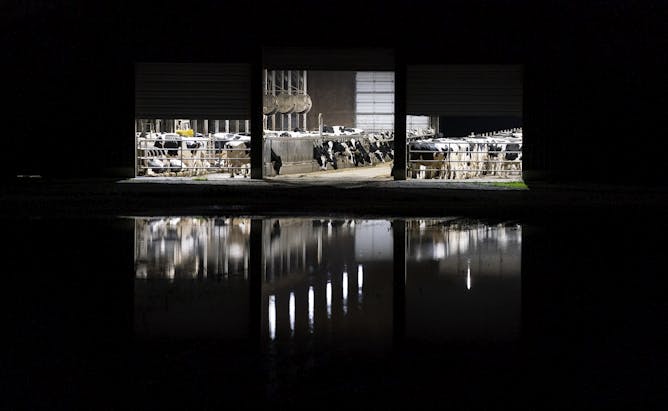|
|
|
|
The solar eclipse on April 8 is one of the most anticipated events of the year. Those on the path of the total solar eclipse — parts of Ontario, Québec, the Maritimes and Newfoundland — will witness an event that, on average, takes place every 375 years.
Today in The Conversation Canada, Nikhil Arora and Mark Richardson at Queen’s University write about the opportunity the total solar eclipse provides to not only engage people with science, but to also invite them to participate in the creation of new knowledge.
During the last eclipse, astronomers noticed a solar corona on the sun’s surface — this time around, NASA is soliciting photos taken by the public. This public data, write Arora and Richardson "will far exceed what could be accomplished by any one experiment or location.”
Also today:
All the best.
|

|
Nehal El-Hadi
Science + Technology Editor
|
|

Throughout time, eclipses have inspired societies to understand the cosmos and its events.
(Shutterstock)
Nikhil Arora, Queen's University, Ontario; Mark Richardson, Queen's University, Ontario
Eclipses have inspired myths, predictions and scientific discoveries. The total solar eclipse occurring on April 8 provides a once-in-a-lifetime opportunity to engage with science and the cosmos.
|

Current bereavement policies do not address the reality of employees with family members that have used, or are planning to use, medical assistance in dying (MAID) services.
(Shutterstock)
Katherine Breward, University of Winnipeg
Most workplace bereavement policies were designed prior to MAID and very few employers have adjusted these policies in light of the new reality of living and dying in Canada.
|

Although medical doctors may be the first point of contact for children exploring their gender identity, many other professions can provide gender-affirming care, such as psychologists, social workers, teachers, counsellors and recreational coaches.
(Shutterstock)
Gio Dolcecore, Mount Royal University
Gender-affirming care assesses psychological, social, medical and surgical options for gender-diverse people.
|

Dairy cows try and stay dry in their barn as flood waters rise near Agassiz, B.C., in November 2021.
THE CANADIAN PRESS/Jonathan Hayward
Stephanie Eccles, Concordia University
Despite improvements in disaster response management since the Abbotsford floods of 2021, long-term animal welfare remains woefully underappreciated in B.C.
|

The Chinese government may access the data collected by Baidu, Alibaba, Tencent, Xiaomi and other operators. How are citizens coping with this constant digital surveillance?
(Shutterstock)
Ariane Ollier-Malaterre, Université du Québec à Montréal (UQAM)
State surveillance of citizens is growing all over the world, but it is a fact of daily life in China. People are developing mental tactics to distance themselves from it.
|
La Conversation Canada
|

Le train Reseau express métropolitain (REM) à la sortie du centre-ville de Montréal, le 8 décembre 2023.
La Presse canadienne/Christinne Muschi
Maude Brunet, HEC Montréal
Québec prépare une réforme de la gouvernance des projets publics, dont celle des transports collectifs. Une agence centralisée et indépendante est-elle la meilleure solution ?
|
Business + Economy
|
-
Jan Bednorz, University of Tartu
Digital nomads are often maligned by locals, but properly planned visa schemes can make sure everyone benefits.
|
|
Environment + Energy
|
-
Anders Ahlström, Lund University; Pep Canadell, CSIRO
Research suggests these forests could disappear by the 2070s.
|
|
Health
|
-
Claire Lancaster, University of Sussex; Alice Stanton, University of Sussex
A new study suggests that talking speed is a more important indicator of brain health than difficulty finding words.
|
|
|
|
| |
| |
| |
| |
|
|
|
|
|
|
|